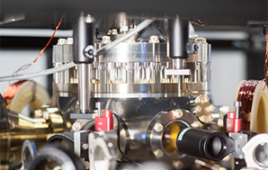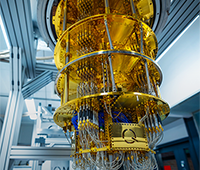
Researchers at the University of Oxford have achieved a quantum logic gate with record-breaking 99.9% precision, reaching the benchmark required theoretically to build a quantum computer.
Quantum computers, which function according to the laws of quantum physics, have the potential to dwarf the processing power of today’s computers, able to process huge amounts of information all at once.
The team achieved the logic gate, which places two atoms in a state of quantum entanglement and is the fundamental building block of quantum computing, with a precision (or fidelity) substantially greater than the previous world record. Quantum entanglement – a phenomenon described by Einstein as ‘spooky’ but which is at the heart of quantum technologies – occurs when two particles stay connected, such that an action on one affects the other, even when they are separated by great distances.
The research, carried out by scientists from the Engineering and Physical Sciences Research Council (EPSRC)-funded Networked Quantum Information Technologies Hub (NQIT), which is led by Oxford University, is reported in the journal Physical Review Letters.
Dr Chris Ballance, a research fellow at Magdalen College, Oxford and lead author of the paper, said: ‘The development of a “quantum computer” is one of the outstanding technological challenges of the 21st century. A quantum computer is a machine that processes information according to the rules of quantum physics, which govern the behaviour of microscopic particles at the scale of atoms and smaller.
‘An important point is that it is not merely a different technology for computing in the same way our everyday computers work; it is at a very fundamental level a different way of processing information. It turns out that this quantum-mechanical way of manipulating information gives quantum computers the ability to solve certain problems far more efficiently than any conceivable conventional computer. One such problem is related to breaking secure codes, while another is searching large data sets. Quantum computers are naturally well-suited to simulating other quantum systems, which may help, for example, our understanding of complex molecules relevant to chemistry and biology.’
Quantum technology is a complex area, but one analogy that has been used to explain the concept of quantum computing is that it is like being able to read all of the books in a library at the same time, whereas conventional computing is like having to read them one after another. This may be over-simplistic, but it is useful in conveying the way in which quantum computing has the potential to revolutionise the field.
Professor David Lucas, of Oxford University’s Department of Physics and Balliol College, Oxford, a co-author of the paper, said: ‘The concept of “quantum entanglement” is fundamental to quantum computing and describes a situation where two quantum objects – in our case, two individual atoms – share a joint quantum state. That means, for example, that measuring a property of one of the atoms tells you something about the other.
‘A quantum logic gate is an operation which can take two independent atoms and put them into this special entangled state. The precision of the gate is a measure of how well this works: in our case, 99.9% precision means that, on average, 999 times out of 1,000 we will have generated the entangled state correctly, and one time out of 1,000 something went wrong.
‘To put this in context, quantum theory says that – as far as anyone has found so far – you simply can’t build a quantum computer at all if the precision drops below about 99%. At the 99.9% level you can build a quantum computer in theory, but in practice it could be very difficult and thus enormously expensive. If, in the future, a precision of 99.99% can be attained, the prospects look a lot more favourable.’
Professor Lucas added: ‘Achieving a logic gate with 99.9% precision is another important milestone on the road to developing a quantum computer. A quantum logic gate on its own does not constitute a quantum computer, but you can’t build the computer without them.
‘An analogy from conventional computing hardware would be that we have finally worked out how to build a transistor with good enough performance to make logic circuits, but the technology for wiring thousands of those transistors together to build an electronic computer is still in its infancy.’
The method used by the Oxford team was invented at NIST in Boulder, USA, and, in a paper published alongside Oxford’s in Physical Review Letters, the NIST team also reports the achievement of 99.9% precision.



